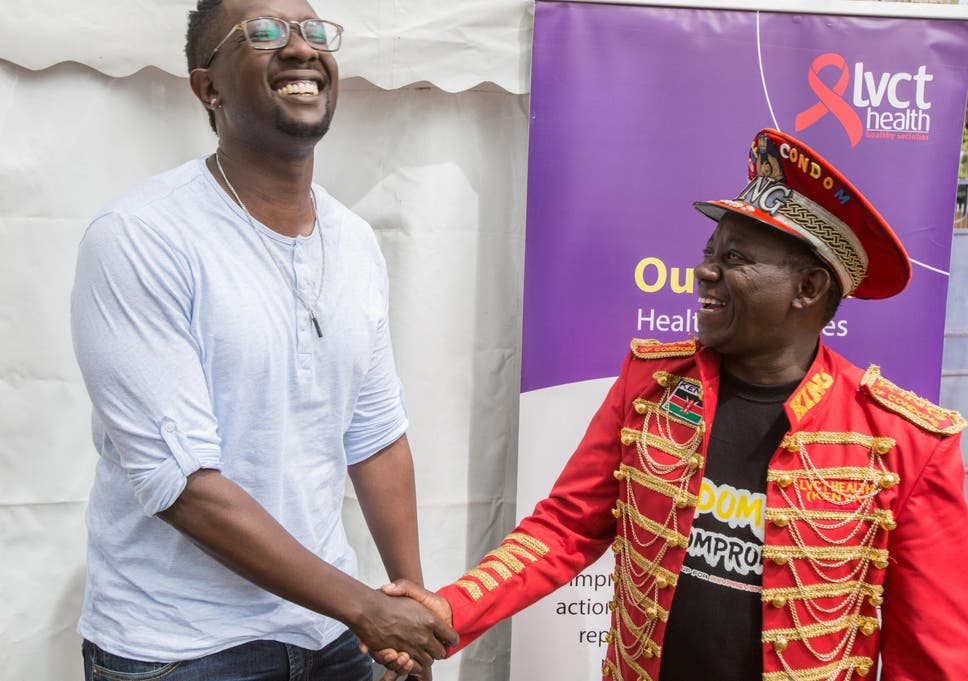AIDSfree: Kenya’s Condom King and his mission to combat HIV taboos
When Stanley Ngara started teaching young Kenyans about safe sex he found many of those present too embarrassed to listen to his message on how they could avoid catching HIV.
Condoms were linked in their mind to prostitution. Having grown up in households where sex was a taboo subject, they could not face hearing him discuss its mechanisms in public. A new approach, he realised, was needed.
Rather than the strait-laced manner adopted by many sexual health trainers, humour was required. At first he tried using puppets, but that still failed to fully engage. That was when he adopted his brash new alter ego: Africa’s King of Condoms.
“In Africa people don’t talk about sex,” the 45-year-old explained. “They do not talk about condoms. There is so much stigma. But because of the way I now dress, people wonder who I am. They want to know more.” Kenya has the joint fourth largest HIV epidemic in the world, with 1.5 million Kenyans living with HIV. The first case was detected in 1984, and by the mid-90s it was one of the major causes of illness in the country, putting strain on the healthcare system and economy.
Since then the Kenyan government has improved the situation. New annual infections are now a third of what they were at the peak of the epidemic, and the authorities have spent heavily to ensure that those affected have access to the latest treatments to try to prevent transmission.
But despite these efforts, 53,000 are still being infected each year – and one of the greatest concerns is infection levels among young people. Surveys showed that 51 per cent of new infections were among those aged 15 to 24, a big jump from 29 per cent in 2013.
According to Africa’s King of Condoms this is why the young must be a focus of HIV prevention.
“I say to them that what your teacher did not tell you, what your father did not tell you, what your uncle did not tell you, the King of Condoms will tell you,” he said. “We have a big issue with ‘sponsoring’, where men have relationships with young girls half their age. The girls are happy to get money and presents like mobile phones in exchange for sex. But they also have a boyfriend their own age too; and that boyfriend will also be wanting an older woman – someone who is not being satisfied by their husband – to ‘sponsor’ them. It is a common situation, and it spreads HIV.”
That is why one of the focuses of The Independent's AIDSfree campaign is to raise money to launch an educational programme targeted at young people in Kenya, particularly young men who are among the least likely to get tested.
At the headquarters of LVCT Health, one of the Kenyan organisations supported by the Elton John AIDS Foundation, Mr Ngara was helping to run just such a workshop targeting young men. They were shown how to use condoms, offered the opportunity to use a self-testing kit, and given advice on how to best sexually please their partner.
Among those present was the Kenyan pop star Tetu Shani, who has added his voice to the cause and also had an HIV test in front of the young men. One of the key elements of the awareness campaign to be paid for by this appeal is to enlist the voices of singers and other role models for young Kenyans to help break the stigma around talking about HIV.
“People still have very archaic views on how you contract HIV and what happens when you contract it,” Mr Ngara said. “Musicians have an important role to play in combating this as ignorance sucks. My hope is that when people see Tetu Shani is getting tested, then they will think it is OK to go and get tested too.”
International development secretary Penny Mordaunt, who through UK Aid is matching every pound donated to this appeal, echoed the importance of the programme. “We need to turn the tide on Aids-related deaths, particularly in sub-Saharan Africa,” she said.
“Young people are disproportionately at risk of HIV infection in Kenya. UK aid is working to save lives and end stigma around HIV and Aids across the globe. I am proud that we are matching up to £2m of the generous public donations to the Aids-free campaign. This will enable the Elton John AIDS Foundation to accelerate access to HIV testing and care for young people living in Nairobi.
“Every time the British public reach into their pockets and donate to a UK Aid Match charity their generosity directly changes the lives of some of the world’s most vulnerable people.”
Money raised from public donations through the AIDSfree appeal will be used to support the Elton John AIDS Foundation projects in six key cities around the world (London, Nairobi, Atlanta, Kiev, Delhi and Maputo). Through UK Aid Match the UK government will double public donations up to £2m to be spent across projects in Maputo and Nairobi.








![[New music] Bizakeem X OBO X Starboy - Medley (Fia/Manya Mash Up)](https://blogger.googleusercontent.com/img/b/R29vZ2xl/AVvXsEg7ePFIjPAcNfeOcxj2y_6d_ufz2GlRhidV-t1PIbOEjWV_xI7vUspjJBQ5MFc2bDyiiJbBeJRiB1cAbBBxMhNDh3K97h3PM8VvTP1HIaHhjMqNqujL7qJR2lwruB9hA8JX5o8_3wdX0XM/s72-c/FB_IMG_15126538139760099.jpg)

Post a Comment